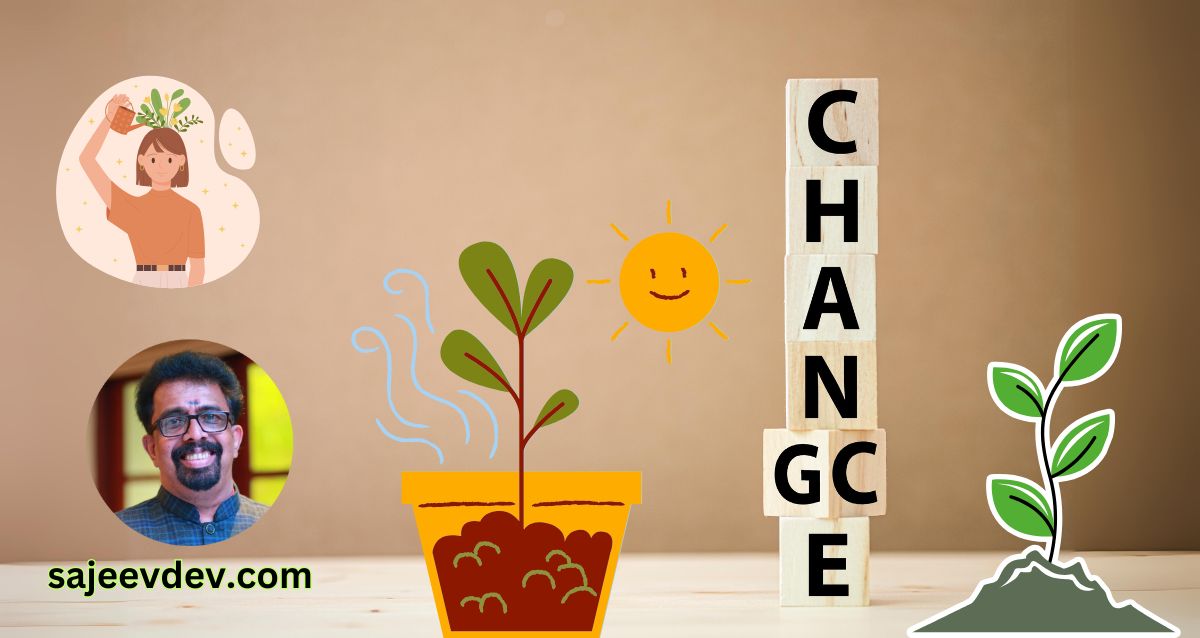Change is an inherent aspect of life, influencing our experiences and personal journeys
Whether we encounter small adjustments in our daily routines or significant life-altering events, transitions are a universal phenomenon that shapes who we are. Each day presents opportunities for growth, driven by the inevitability of change. Understanding this concept can be liberating, encouraging us to embrace alterations instead of resisting them.
Throughout our lives, we face numerous transitions, such as evolving relationships, career advancements, and shifting personal goals. These changes can evoke feelings of uncertainty and discomfort. However, rather than viewing them solely as challenges, we can perceive them as potential springboards for development. Accepting that change is a constant allows us to foster resilience, adaptability, and a positive outlook toward the future.
By acknowledging that we cannot entirely control our circumstances, we can redirect our focus from what we cannot change to how we can respond to these situations. Embracing change opens doors to new experiences and insights that we might not have considered otherwise. It is through these transitions that we often discover new strengths, refine our skills, and cultivate a deeper understanding of ourselves and the world around us.
As we navigate the complexities of life, it is crucial to recognize that change is not merely an obstacle; it is a vital component of personal and collective growth. By fostering a mindset that welcomes change, we not only enhance our capacity for adaptation but also position ourselves to seize new opportunities that can lead to enriching experiences. In this blog post, we will explore how embracing change can catalyze personal development and contribute to a fulfilling life.
Types of Life Transitions
Life transitions are an inherent part of the human experience. They can occur in various dimensions, encompassing personal, professional, and relational changes. Understanding the types of transitions can help individuals navigate these phases more effectively, recognizing the emotions that often accompany them as normal and constructive aspects of life.
Personal transitions often include significant events such as moving to a new city, changing one’s physical health, or entering new stages of life like parenthood or retirement. These changes can provoke a mixture of feelings, from excitement to anxiety, as individuals step into uncharted territory. For instance, a young adult graduating from college may feel a blend of pride and uncertainty about future job prospects. Acknowledging these emotions not only validates the experience but also paves the way for personal development.
Professional transitions can manifest through job changes, promotions, or career shifts. For example, an individual transitioning from a stable position to a startup environment may experience fear of instability coupled with excitement for innovation and creativity. These career-related changes often push individuals to acquire new skills and adapt to different workplace dynamics, which can be both challenging and rewarding.
Lastly, relational transitions involve changes in the dynamics of personal relationships, such as marriage, divorce, or the loss of a loved one. Such transformations can trigger a wide spectrum of emotional responses, including grief, joy, and confusion. Adapting to a new role within a relationship, such as becoming a spouse or co-parent, can profoundly alter one’s identity and support system.
In sum, recognizing and understanding the various types of life transitions enables individuals to better embrace change. By normalizing the diverse emotions associated with transitions—whether personal, professional, or relational—people can cultivate resilience, ultimately viewing these periods as opportunities for growth.
The Psychological Impact of Change
Change is an inherent part of life’s journey, and its psychological impact can vary significantly among individuals. Common emotional responses to change often include anxiety and fear. These feelings arise because uncertainty can provoke a natural instinct to resist transition, making individuals feel vulnerable. For instance, the prospect of a new job or a relocation can trigger concerns about the unknown, leading to self-doubt and apprehension.
However, alongside these negative feelings, change can also engender positive emotions such as excitement and relief. The anticipation of new opportunities prompts individuals to envision fresh beginnings, fostering a sense of growth. Embracing change as a possibility for personal development encourages a more optimistic outlook. Transitioning to a different phase in one’s life can become a catalyst for learning new skills, meeting diverse groups of people, and broadening perspectives.
Reframing one’s mindset toward change is crucial in mitigating negative emotional responses. By recognizing that change often precedes growth, individuals can cultivate resilience. This shift in perspective allows one to acknowledge the potential benefits of change, such as increased adaptability and enhanced problem-solving skills. Techniques such as mindfulness and positive affirmations can be employed to navigate emotional responses effectively. These practices help individuals ground themselves, reducing anxiety and emphasizing the excitement that change can bring.
Ultimately, the psychological effects of change are multifaceted. While it is normal to experience fear and anxiety, it is equally important to recognize and embrace the positive feelings associated with new opportunities. By adopting a constructive mindset and focusing on the potential for growth, individuals can transform their relationship with change, leading to improved emotional well-being and a more fulfilling life experience.
Understanding the Growth Mindset
The concept of a growth mindset, pioneered by psychologist Carol Dweck, revolves around the belief that abilities and intelligence can be developed through dedication, effort, and the willingness to learn. This mindset contrasts sharply with a fixed mindset, where individuals perceive their skills and intelligence as static traits, unchangeable regardless of circumstances. The origins of the growth mindset can be traced back to extensive research conducted by Dweck, who discovered that those who viewed their abilities as improvable were more likely to take on challenges, persist through difficulties, and ultimately achieve greater success.
Fundamentally, the principles of a growth mindset emphasize resilience, effort, and the value of constructive feedback. When individuals adopt this viewpoint, they are more apt to embrace challenges, seeing them as opportunities rather than obstacles. In this framework, failures are not seen as indicators of inadequacy, but rather as vital components of the learning process. This perspective provides emotional resilience, which is crucial in periods of change and transition. By perceiving challenges through the lens of a growth mindset, one can transform fear into motivation.
Moreover, cultivating a growth mindset enhances the ability to accept and embrace change. When faced with new circumstances, individuals who maintain this mindset are inclined to approach them with curiosity and openness rather than trepidation. They seek out opportunities to learn and grow, leading to personal and professional development. This adaptability becomes particularly important in today’s rapidly evolving world, where change is the only constant. Ultimately, fostering a growth mindset can empower individuals to view transitions not just as disruptions, but as valuable opportunities for growth and enrichment in their lives.
Adapting to Change: Strategies and Tips
Change is an inherent aspect of life, and adapting to it can significantly influence personal growth. Employing effective strategies can ease the transition and create a positive outlook. One notable approach is mindfulness, which encourages individuals to stay present and accept their current circumstances without judgment. Mindfulness practices, such as meditation or deep-breathing exercises, help in managing stress and fostering resilience during periods of uncertainty.
Self-reflection is another potent tool for adapting to change. By taking the time to evaluate personal thoughts, feelings, and past experiences, individuals can identify patterns that may hinder their growth. This introspection allows for a clearer understanding of how to respond to new situations, as it brings to light one’s strengths and weaknesses. Journaling can be particularly beneficial, as it provides a structured way to articulate thoughts and track progress over time.
Setting achievable goals is essential when navigating through transitions. Breaking down larger objectives into smaller, manageable tasks can create a sense of accomplishment and keep motivation levels high. By establishing specific, measurable, attainable, relevant, and time-bound (SMART) goals, individuals can maintain focus amidst uncertainty and track their progress effectively.
Finally, seeking support from others can play a critical role during periods of change. Engaging with friends, family, or professional support groups provides a valuable network that offers encouragement and guidance. Sharing experiences with others who are undergoing similar transitions fosters a sense of community and reinforces the understanding that change is a shared experience. Utilizing these strategies can significantly enhance adaptability and contribute to personal growth during transitions.
The Role of Resilience in Navigating Change
Resilience is defined as the capacity to recover quickly from difficulties and adapt well to change. In the context of life transitions, whether they are personal, professional, or societal, resilience plays a crucial role. Individuals who exhibit resilience are better equipped to handle the uncertainties and stresses that come with change. They are not only able to bounce back from setbacks but are also capable of leveraging their experiences for future growth.
Cultivating resilience is a proactive process that can significantly enhance one’s ability to navigate change. Strategies such as fostering a strong support system, developing a positive outlook, and practicing problem-solving skills contribute to building resilience. Engaging in activities that promote mental and emotional well-being, such as mindfulness, exercise, and creative pursuits, can further strengthen one’s resilience. By actively working on these aspects, individuals can prepare themselves to face challenges with a greater sense of confidence and clarity.
The impact of resilience on managing life transitions cannot be overstated. When individuals face changes, whether it be a career shift, a relationship transformation, or adapting to new environments, their level of resilience often determines the outcome of those experiences. Resilient individuals tend to approach change with a proactive mindset, viewing obstacles as opportunities to learn and grow. This perspective allows them to remain focused on their goals and values, fostering a sense of agency even in insecure circumstances.
Ultimately, the development of resilience is vital not only for handling immediate challenges but also for thriving in an ever-changing world. By viewing changes through the lens of resilience, individuals can transform potentially overwhelming transitions into meaningful pathways for personal and professional growth.
Learning from Change: Insights and Skills Gained
Change is an inherent aspect of life, and navigating through transitional periods often brings about valuable insights and skills. By encountering diverse situations, individuals cultivate adaptability, resilience, and problem-solving capabilities. These attributes become essential as they traverse the complexities of their personal and professional landscapes. Each experience serves as a lesson, demonstrating the inevitable nature of change and the personal growth that accompanies it.
One notable example is the experience of a mid-career professional who transitioned from a long-term job to a new industry. Initially faced with uncertainty and self-doubt, this individual began to view the transition as an opportunity for self-discovery. Enrolling in courses related to the new field, they honed their analytical skills and technical knowledge. This proactive approach not only allowed them to acquire relevant skills but also fostered a newfound confidence that had previously eluded them. The ability to learn swiftly during this period proved critical, illustrating how change can act as a catalyst for personal empowerment.
Moreover, navigating changes often enhances emotional intelligence. Individuals learn to manage their emotions and better understand those of others. This understanding improves interpersonal relationships and communication, both essential skills in any collaborative environment. For instance, someone who has experienced a major life change, such as relocating to a new city, may develop a heightened awareness of people’s challenges and emotions. This deeper empathy can lead to stronger connections and support networks, which are invaluable when facing further changes.
Thus, learning from change fosters not only individual skills but also contributes to a greater understanding of our capacity for evolution. The insights gained from these experiences often shape how we approach future challenges, reinforcing that change, though daunting, can provide significant opportunities for growth. As we embrace life transitions, it is crucial to recognize the myriad skills and lessons that emerge in the process.
The Long-Term Benefits of Embracing Change
Embracing change is a vital aspect of personal and professional development that can yield significant long-term benefits. One of the primary advantages is enhanced adaptability, which equips individuals to navigate the uncertainties and surprises life invariably presents. When individuals commit to embracing change, they refine their ability to adjust their strategies and approaches, leading to higher levels of personal fulfillment. This adaptability often transforms challenges into opportunities for growth, enabling individuals to discover new passions and interests that may have previously remained unexplored.
Career growth is another critical benefit that arises from a proactive attitude towards change. In a rapidly evolving job market, cultivating resilience is essential. Those who embrace change are more likely to pursue continuous learning, acquire new skills, and adapt to emerging trends. This commitment to self-improvement not only positions them as valuable assets within their organizations but also opens doors to new career opportunities. Embracing change empowers individuals to stay relevant in their fields, fosters innovative thinking, and enhances problem-solving abilities, resulting in significant progress and recognition in their careers.
Moreover, adapting to change can lead to stronger, more meaningful relationships. Change often encourages individuals to step outside their comfort zones and engage with diverse perspectives. This willingness to connect fosters empathy and understanding, enriching interpersonal dynamics. Relationships forged through shared experiences of change can increase a sense of community and belonging. As people grow together through transitions, they cultivate networks of support that contribute to mutual growth and emotional well-being.
Ultimately, the long-term benefits of embracing change are profound. A proactive approach not only nurtures personal fulfillment and career advancement but also strengthens relationships, paving the way for a future enriched by growth and adaptability. By viewing change as an opportunity, individuals position themselves for enduring success in various aspects of their lives.
Change as a Pathway to Fulfillment
As we reflect on the journey of embracing change, it becomes evident that transitions play a crucial role in personal and professional growth. Change, often perceived as daunting or disruptive, can actually serve as a catalyst for self-improvement and enrichment. By adopting a perspective that views change as an opportunity, individuals can unlock new avenues for development and fulfillment.
The process of navigating change enables individuals to cultivate resilience and adaptability, essential traits in today’s dynamic environment. When faced with new challenges, whether in career shifts, relocation, or personal transformations, it is imperative to recognize that such experiences can lead to significant growth. This growth is not purely about overcoming obstacles; it encompasses learning from them and expanding one’s horizons in the process.
Moreover, embracing change fosters a sense of openness to new experiences, encouraging exploration beyond one’s comfort zone. This transition can lead to the discovery of latent talents, skills, or passions that may have remained dormant. Through this journey, people often find that change is not just an end but a pathway to previously unknown opportunities for fulfillment.
Finally, fostering a mindset that celebrates change can enhance overall well-being. Accepting that transitions are a natural part of life empowers individuals to approach new beginnings with enthusiasm rather than apprehension. In recognizing that change is an essential component of growth, we can learn to embrace our evolving selves and appreciate the multifaceted journey of life.
In conclusion, viewing change as an opportunity for growth can profoundly affect our lives. By welcoming change with an open heart and mind, we pave the way for a more fulfilling existence, transforming challenges into stepping stones towards a richer, more meaningful life.









